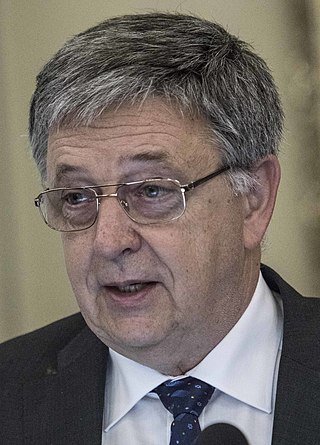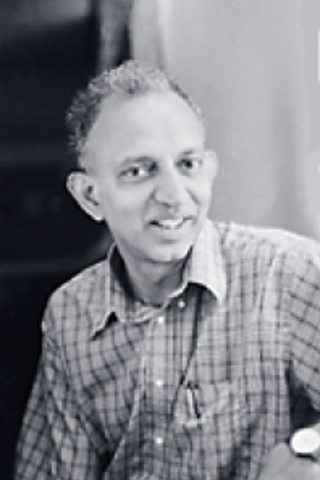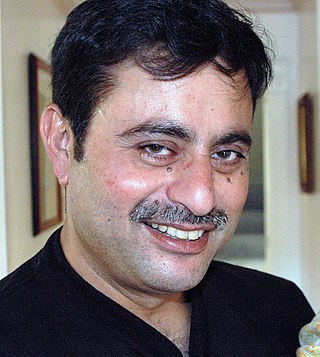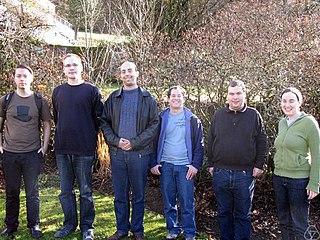Related Research Articles

Indian Institute of Technology Kanpur is a public institute of technology located in Kanpur, Uttar Pradesh, India. It was declared an Institute of National Importance by the Government of India under the Institutes of Technology Act. IIT Kanpur is ranked among the most prestigious academic institutions in India.

Madhu Sudan is an Indian-American computer scientist. He has been a Gordon McKay Professor of Computer Science at the Harvard John A. Paulson School of Engineering and Applied Sciences since 2015.

László Lovász is a Hungarian mathematician and professor emeritus at Eötvös Loránd University, best known for his work in combinatorics, for which he was awarded the 2021 Abel Prize jointly with Avi Wigderson. He was the president of the International Mathematical Union from 2007 to 2010 and the president of the Hungarian Academy of Sciences from 2014 to 2020.
Neeraj Kayal is an Indian computer scientist and mathematician noted for development of the AKS primality test, along with Manindra Agrawal and Nitin Saxena. Kayal was born and raised in Guwahati, India.

Nitin Saxena is an Indian scientist in mathematics and theoretical computer science. His research focuses on computational complexity.
Nancy Ann Lynch is a computer scientist affiliated with the Massachusetts Institute of Technology. She is the NEC Professor of Software Science and Engineering in the EECS department and heads the "Theory of Distributed Systems" research group at MIT's Computer Science and Artificial Intelligence Laboratory.

Vijay Virkumar Vazirani is an Indian American distinguished professor of computer science in the Donald Bren School of Information and Computer Sciences at the University of California, Irvine.

Ravindran Kannan is a Principal Researcher at Microsoft Research India, where he leads the algorithms research group. He is also the first adjunct faculty of Computer Science and Automation Department of Indian Institute of Science.

Avi Wigderson is an Israeli mathematician and computer scientist. He is the Herbert H. Maass Professor in the school of mathematics at the Institute for Advanced Study in Princeton, New Jersey, United States of America. His research interests include complexity theory, parallel algorithms, graph theory, cryptography, distributed computing, and neural networks. Wigderson received the Abel Prize in 2021 for his work in theoretical computer science. He also received the 2023 Turing Award for his contributions to the understanding of randomness in the theory of computation.
Arvind is the Johnson Professor of Computer Science and Engineering in the Computer Science and Artificial Intelligence Laboratory (CSAIL) at the Massachusetts Institute of Technology (MIT). He is a Fellow of the Institute of Electrical and Electronics Engineers (IEEE) and the Association for Computing Machinery (ACM). He was also elected as a member into the National Academy of Engineering in 2008 for contributions to dataflow and multithread computing and the development of tools for the high-level synthesis of digital electronics hardware.

Rajeev Motwani was an Indian American professor of Computer Science at Stanford University whose research focused on theoretical computer science. He was a special advisor to Sequoia Capital. He was a winner of the Gödel Prize in 2001.
Ketan Mulmuley is a professor in the Department of Computer Science at the University of Chicago, and a sometime visiting professor at IIT Bombay. He specializes in theoretical computer science, especially computational complexity theory, and in recent years has been working on "geometric complexity theory", an approach to the P versus NP problem through the techniques of algebraic geometry, with Milind Sohoni of IIT Bombay. He is also known for his result with Umesh Vazirani and Vijay Vazirani that showed that "Matching is as easy as matrix inversion", in a paper that introduced the isolation lemma.
Arnold Leonard Rosenberg is an American computer scientist. He is a distinguished university professor emeritus at the University of Massachusetts Amherst, and despite his retirement from UMass he continues to hold research positions at Northeastern University and Colorado State University.
Mangalore Anantha Pai was an Indian electrical engineer, academic and a Professor Emeritus at the University of Illinois at Urbana–Champaign. A former professor of electrical engineering at the Indian Institute of Technology, Kanpur, he is known for his contributions in the fields of power stability, power grids, large scale power system analysis, system security and optimal control of nuclear reactors and he has published 8 books and several articles. Pai is the first India born scientist to be awarded a PhD in Electrical Engineering from the University of California, Berkeley.

Amit Kumar is Professor in the Department of Computer Science and Engineering at the Indian Institute of Technology Delhi. He received his B.Tech. degree from Indian Institute of Technology Kanpur in 1997, and Ph.D. from Cornell University in 2002. He worked as Member of Technical Staff at Bell Labs, Murray Hill, New Jersey, U.S. during 2002–2003. He joined IIT Delhi as faculty member in 2003. He works in the area of combinatorial optimization, approximation algorithms and online algorithms. He is working extensively on problems arising in scheduling theory, clustering, and graph theoretic algorithmic problems.
Rae Marie Robertson-Anderson is an American biophysicist who is a Professor and Associate Provost at the University of San Diego. She works on soft matter physics and is particularly interested in the transport and molecular mechanics of biopolymer networks. Robertson-Anderson is a member of the Council on Undergraduate Research.
MargaretaAckerman is a Belarussian-American computer scientist known for her research in cluster analysis and algorithmic composition of music. She is an assistant professor of computer science and engineering at Santa Clara University, and the founder and CEO of algorithmic music firm WaveAI.

Dana Moshkovitz Aaronson is an Israeli theoretical computer scientist whose research topics include approximation algorithms and probabilistically checkable proofs. She is an associate professor of computer science at the University of Texas at Austin.

The University College of Science, Technology and Agriculture are two of five main campuses of the University of Calcutta (CU). The college served as the cradle of Indian Sciences by winning the Nobel Prize in Physics in 1930 and many fellowships of the Royal Society London.
Bushra Ateeq is a Professor and a Senior Fellow of the DBT/Wellcome Trust India Alliance in the Department of Biological Sciences and Bioengineering (BSBE), IIT Kanpur specializing in cancer biology and molecular oncology. She was awarded the Shanti Swarup Bhatnagar Prize for Science and Technology in Medical Sciences in the year 2020. Her research interest involves exploration of the genetic and epigenetic changes that initiate cancer and its progression. She is also focusing on understanding the molecular events that drive cancer and resistance towards chemotherapeutic drugs.
References
- 1 2 3 4 5 6 7 8 9 Barna Saha and the golden road to UC San Diego, UC San Diego Computer Science & Engineering, 17 February 2022, retrieved 2022-06-28
- 1 2 "Lunch with Barna Saha", CS Women @ UMass Amherst, 18 May 2016
- 1 2 3 4 Curriculum vitae (PDF), University of Maryland, College Park, 2013, retrieved 2022-06-28
- 1 2 3 Young Alumnus Awardee 2020: Dr. Barna Saha (MT/CSE/2006), IIT Kanpur, retrieved 2022-06-28
- ↑ Barna Saha at the Mathematics Genealogy Project
- ↑ Szegedy, Mario (2013), "The Lovász Local Lemma - A Survey", in Bulatov, Andrei A.; Shur, Arseny M. (eds.), Computer Science – Theory and Applications – 8th International Computer Science Symposium in Russia, CSR 2013, Ekaterinburg, Russia, June 25–29, 2013, Proceedings, Lecture Notes in Computer Science, vol. 7913, Springer, pp. 1–11, doi:10.1007/978-3-642-38536-0_1, ISBN 978-3-642-38535-3
- ↑ UMass Amherst Computer Scientist and International Team Offer Theoretical Solution to 36-year-Old Computation Problem, UMass Amherst, 28 November 2017, retrieved 2022-06-28
- ↑ Three UMass Amherst Early Career Faculty Awarded 2019 Sloan Research Fellowships: 'Most promising researchers in their fields' join elite group of international scholars, UMass Amherst, 19 February 2019, retrieved 2022-06-28